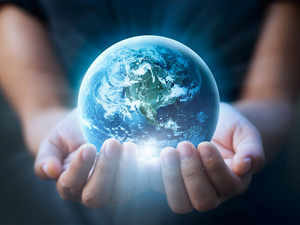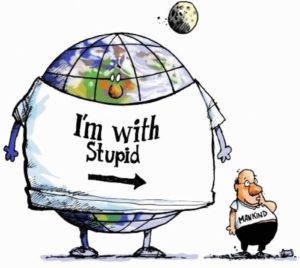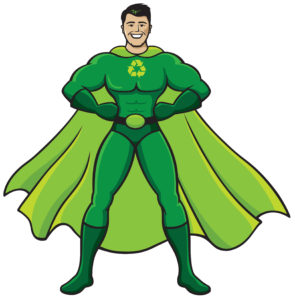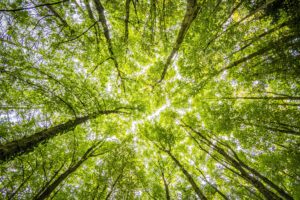Beyond Earth Day 2019
 I probably attended my first Earth Day celebration a little over 30 years ago. Celebrations then had more of a hippie, “we feel great cause we’re loving on the Earth”, light-hearted vibe. The biggest focus was on reducing, reusing, and recycling with some information on endangered species and biodiversity thrown in for good measure. The terms global warming and climate change weren’t the buzzwords they are today as it would still be another couple of months before James Hansen, then Director of the NASA Goddard Space Institute, would report on the “greenhouse effect” to the US Senate Committee on Energy and Natural Resources, and its damaging effects on our global climate.
I probably attended my first Earth Day celebration a little over 30 years ago. Celebrations then had more of a hippie, “we feel great cause we’re loving on the Earth”, light-hearted vibe. The biggest focus was on reducing, reusing, and recycling with some information on endangered species and biodiversity thrown in for good measure. The terms global warming and climate change weren’t the buzzwords they are today as it would still be another couple of months before James Hansen, then Director of the NASA Goddard Space Institute, would report on the “greenhouse effect” to the US Senate Committee on Energy and Natural Resources, and its damaging effects on our global climate.
 Fast forward 30 years and recycling paper, plastic, and remembering our reusable bags are just not going to get us there. One of the most alarming facts we must contend with is the passing of the 400ppm of carbon dioxide in the atmosphere a few years back and its resultant increase in global mean temperature. In the last 100 years or so our world has warmed an astonishing 2 degrees Fahrenheit as CO2 levels have spiked from around 300ppm to over 400ppm. While this may not seem like much but remember we’re talking about a global average. The implications of a 2-degree increase has major impacts on global weather patterns with the creation of “superstorms”, the unpredictability of local weather patterns, crop’s viability, and water availability. All of this affects everyone everywhere and as the polar caps continue to melt unabated at an alarming rate, we are losing precious coastline every day creating both safety and exponential economic issues. If that isn’t enough, we now have something called the “Pacific Garbage Patch” a thing most of us couldn’t even conceive of a mere couple decades ago, and pollution found at the deepest depths of our murky oceans threatens marine wildlife, food sources, and livelihoods. What’s further frightening is how normalized these reports have become and how many people remain asleep behind the wheel as we steer ourselves off the proverbial cliff. The changes once predicted not to happen for another 50 years, are happening now. We’ve seen over and over again, that governments and corporations are failing to act in any real meaningful way with most failing to act period. To the point of even continuing to portray global warming as a perpetrated hoax rather than honoring the scientific data and actual evidence our world normally marries itself to, instead preferring to cherry pick the information that’s convenient.
Fast forward 30 years and recycling paper, plastic, and remembering our reusable bags are just not going to get us there. One of the most alarming facts we must contend with is the passing of the 400ppm of carbon dioxide in the atmosphere a few years back and its resultant increase in global mean temperature. In the last 100 years or so our world has warmed an astonishing 2 degrees Fahrenheit as CO2 levels have spiked from around 300ppm to over 400ppm. While this may not seem like much but remember we’re talking about a global average. The implications of a 2-degree increase has major impacts on global weather patterns with the creation of “superstorms”, the unpredictability of local weather patterns, crop’s viability, and water availability. All of this affects everyone everywhere and as the polar caps continue to melt unabated at an alarming rate, we are losing precious coastline every day creating both safety and exponential economic issues. If that isn’t enough, we now have something called the “Pacific Garbage Patch” a thing most of us couldn’t even conceive of a mere couple decades ago, and pollution found at the deepest depths of our murky oceans threatens marine wildlife, food sources, and livelihoods. What’s further frightening is how normalized these reports have become and how many people remain asleep behind the wheel as we steer ourselves off the proverbial cliff. The changes once predicted not to happen for another 50 years, are happening now. We’ve seen over and over again, that governments and corporations are failing to act in any real meaningful way with most failing to act period. To the point of even continuing to portray global warming as a perpetrated hoax rather than honoring the scientific data and actual evidence our world normally marries itself to, instead preferring to cherry pick the information that’s convenient.
For most of you reading this, I probably don’t need to rehash the evidence or convince you that climate change is real. It’s here, It’s not going away no matter how much we stick our collective heads in the sand, and not enough is being done about it.
Waiting on a Hero
Here’s where the story gets tricky. Most of us know this but what we don’t know is what that will mean  to our futures. Basically no one does. Not even our learned scientists. These are paths we have yet to tread in our human history. The last time the CO2 in the atmosphere was this high, humans didn’t exist. During the entire course of human history CO2 levels have never been at this level and so we really don’t know the implications. I for one, would prefer not to find out. I’m a creature of habit and I’d be happy to stay in our little Earth bubble for a while longer thank you. The bigger question; what do we do about it? One thing I think we don’t do – we don’t wait for anyone else to fix the problem. There is no hero. No one is going to swoop in and save us. And by us I mean you, the person reading this blog. No one is going to save you or your family, and here’s the rub…or your children or your children’s children because let’s face it, they’re the ones that are going to have to pay this piper. They’re going to be the ones to reap what we’ve sown. Things may get annoying and even downright uncomfortable for us but it’s going to be down the road that this Earth may become uninhabitable. At least for humans anyway.
to our futures. Basically no one does. Not even our learned scientists. These are paths we have yet to tread in our human history. The last time the CO2 in the atmosphere was this high, humans didn’t exist. During the entire course of human history CO2 levels have never been at this level and so we really don’t know the implications. I for one, would prefer not to find out. I’m a creature of habit and I’d be happy to stay in our little Earth bubble for a while longer thank you. The bigger question; what do we do about it? One thing I think we don’t do – we don’t wait for anyone else to fix the problem. There is no hero. No one is going to swoop in and save us. And by us I mean you, the person reading this blog. No one is going to save you or your family, and here’s the rub…or your children or your children’s children because let’s face it, they’re the ones that are going to have to pay this piper. They’re going to be the ones to reap what we’ve sown. Things may get annoying and even downright uncomfortable for us but it’s going to be down the road that this Earth may become uninhabitable. At least for humans anyway.
If we’re going to avoid this worst-case, doomsday scenario we need to change miles beyond reusable bags and metal straws. Don’t get me wrong, those steps are important, but we need to think way beyond that. Here are some of my thoughts for how we begin make this change.
Change Hurts but it Doesn’t Have To
I feel there are a few major areas that we need to be focusing on right away. One is replanting trees as much as possible. They are our greatest allies in reducing the carbon in the atmosphere. Although other chemicals in the atmosphere are more toxic, CO2 is the most abundant and the most obvious solution is to remove it from the atmosphere en masse and trees and plants are the best viable options at this juncture. Several organizations agree with me on this point. You can check them out here:
The Nature Conservancy Plant a Billion Trees Project
The Nature Conservancy Plant a Billion Trees Project
One Tree Planted
Ecoasia
Learning about tree planting and what some of the above organizations are doing is a great start. Donating funds is an even greater step but don’t stop there, plant some trees of your own! Learn about your climate and trees that are native to your locale, hearty, and good carbon sequesters. Much of the temperate climates of the world were once covered in deciduous forests and as important as planting trees is the process of reforestation. Planting trees is a part of that process but it’s learning to think like a forest and to restore what has been lost. Not just trees but understory, riparian buffers, and creating forest gardens that mimic forests in structure and function.

Secondly, developing a “can do”, self-sufficient mindset is not only a good thing it may be a necessary thing. As the climate continues to change and therefore become less predictable with ensuing dramatic weather patterns, learning to function in changing times can be not only helpful but potentially critical. Knowing what plants grow in your area, what other food sources are available, knowing how to forage and survive may one day be life-saving. Along with that leaving a part of your land wild will provide food and shelter for bees, native pollinators, birds, and other mammals allowing you to connect with the land in a meaningful way. For too long we’ve been strangers in a strange land, sadly ignorant about this thing we call “Nature” as if humanity’s decision to leave it behind was one we could make without disastrous consequences. Learning to grow our own food moving away from the massively destructive corporate farming agro-giants will impact our world in such a beautiful and powerful way. More importantly, learning to farm in a new way working with the Earth in less disruptive ways.
Thirdly, we to need to stop giving money to corporations that don’t give a crap about the Earth. That’s for starters but truly beyond that, we need to begin thinking beyond the capitalist model. It just doesn’t work. It inspires maniacal, genocidal greed and a state of sociopathic narcissism that has become another one of those cringe-worthy, new normals. How can we continue to support corporations that poison the Earth, want to monopolize our food supply in the form of nutrient deficient monocrops, and continue to party like it’s 1999? They have yet to wake up and smell the proverbial coffee, but I can GUARANTEE you if you stop giving them your money, they surely will. We’ve tried holding these companies accountable and all we get is a bunch of greenwashing. Instead adopt a self-sufficient attitude towards creating your own personal care, health, and cleaning products or shop local with those small businesses that do care and have made the environment like yours truly and others.
And finally, we need to recognize the inherent Spirit and consciousness inherent in Earth and all Her creations. We need to relearn what it means to be human. We as the most modern humans to date have yet to truly come home to this planet and our legacy has not been a good one. We comprise significantly less than 1% of the world’s species and yet we’re responsible for killing off 83% of the world’s species. We need to recognize our own destructive natures and instead of solely pointing fingers, we need to see this as our responsibility. Yes, you reading this blog and me the writer of this blog. We all need to get on board and recognize our one common denominator is this planet, the air we breathe, the food we eat, this place we depend upon. Because for all of our superficial differences and petty disagreements we all call this place “home” and it’s time we start acting like it.
Click here to learn more about how Green Girl Herbs & Healing is working to live more sustainably on Planet Earth.


